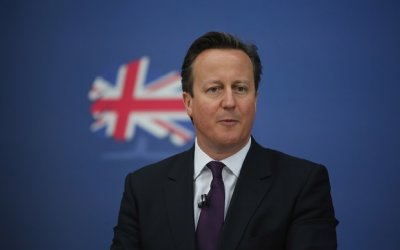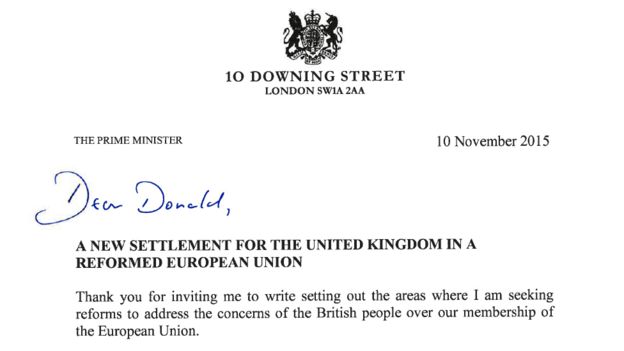David Cameron sets out EU reform goals

David Cameron has outlined his four goals for reforming the UK’s membership of the EU, including restrictions on benefits for people coming to the UK.
He said Britain faced a “huge decision” in the in/out referendum promised before the end of 2017.
But he said he was confident of getting what he wanted from reform talks.
Anti-EU campaigners say the talks are a “gimmick” – and the European Commission said the UK’s benefits proposals could break free movement laws.
- Follow all the latest developments with BBC Politics Live
Mr Cameron has formally set out his demands in a letter to the president of the European Council, saying four objectives lie at the heart of the UK’s renegotiations:
- Protection of the single market for Britain and other non-euro countries
- Boosting competitiveness by setting a target for the reduction of the “burden” of red tape
- Exempting Britain from “ever-closer union” and bolstering national parliaments
- Restricting EU migrants’ access to in-work benefits such as tax credits
Mr Cameron hit back at claims by former Tory chancellor Lord Lawson that the four goals were “disappointingly unambitious”, saying they reflected what the British people wanted and would be “good for Britain and good for the European Union”.
“It is mission possible and it is going to take a lot of hard work to get there,” said the prime minister.
Analysis by BBC Europe Editor Katya Adler

Curbing EU migration is by far the most vexed issue, although some areas are welcomed by the majority of other EU countries – such as putting a moratorium on the ability of citizens of new EU members’ to live and work across the EU until their economies have caught up, also cracking down on benefit tourism and limiting child benefits and out-of work benefits for migrants.
The sticking point is undoubtedly in-work benefits. Central and Eastern European countries with a fluid workforce, such as Poland, are loud opponents, although privately they say they would be happy if their best and brightest would think twice before abandoning their homeland.
But it is powerhouse Germany that will be the most stubborn stick in the wheel here.
Discriminating against EU workers goes against one of the founding EU principles – the freedom to work anywhere in the European Union.
Again though, Germany has been clear it will do its utmost to accommodate the UK in its reform demands.
The toughest task he is likely to face is persuading other EU leaders to accept restrictions on in-work benefits for new arrivals to the UK, which Mr Cameron said was vital to cut “very high” and “unsustainable” levels of immigration.
He said: “I understand how difficult some of these welfare issues are for some member states, and I’m open to different ways of dealing with this issue.
“But we do need to secure arrangements that deliver on objectives set out in the Conservative manifesto to control migration from the European Union.”
Mr Cameron claimed 40% of recent European Economic Area migrants received an average of around £6,000 a year of in-work benefits.
The European Commission said Mr Cameron’s benefit restriction proposals were “highly problematic” as they affected the “fundamental freedoms of our internal market” and amounted to “direct discrimination between EU citizens”.
But the Commission said it viewed the letter as the starting point of negotiations and it would work with the PM for a “fair deal for Britain which is also fair for all the other member states”.
German Chancellor Angela Merkel said she was “reasonably confident” a deal could be reached with the UK that would see it remaining in the EU.
Mr Cameron has said he wants the UK to stay in a reformed EU, but he has not ruled out recommending leaving if he cannot secure the change he wants with the leaders of the other 27 EU countries.
He ruled out a second referendum if Britain voted to leave, saying: “You the British people will decide. At that moment you will hold this country’s destiny in your hands. This is a huge decision for our country – perhaps the biggest we will make in our lifetimes. And it will be a final decision.”
In focus: The Cameron letter to Tusk

David Cameron’s letter to Donald Tusk reprises many of the points he made in his speech, and does not include any new demands.
It says the UK will not stand in the way of further eurozone integration but calls for safeguards to protect British business from discrimination and a formal recognition that the EU has more than one currency.
It says: “Our concerns really boil down to one word: flexibility.”
On immigration, the letter calls for a “crackdown on the abuse of free movement”, including longer re-entry bans for fraudsters and those who engage in “sham marriages” – and stronger powers to deport criminals.
People coming to the UK “must live here and contribute for four years before they qualify for in-work benefits or social housing”, writes Mr Cameron.
The PM says he hopes the letter will “provide a clear basis” for reaching a “legally-binding and irreversible” agreement and “where necessary have force in treaties”.
If an agreement can be reached on his four demands, Mr Cameron tells Mr Tusk: “I am ready to campaign with all my heart and soul to keep Britain inside a reformed European Union.”
Source: BBC – David Cameron sets out EU reform goals





























